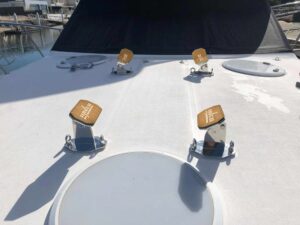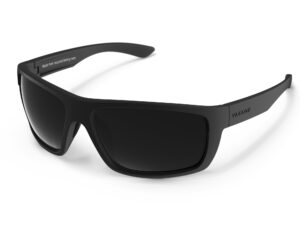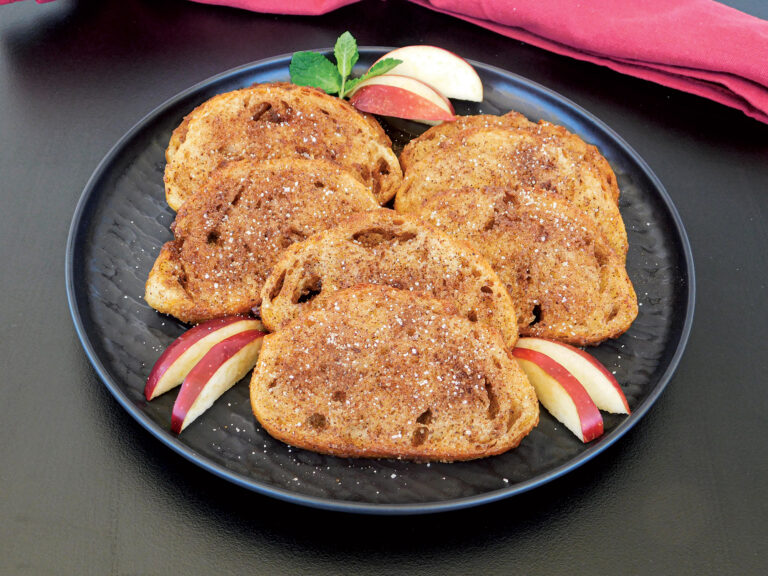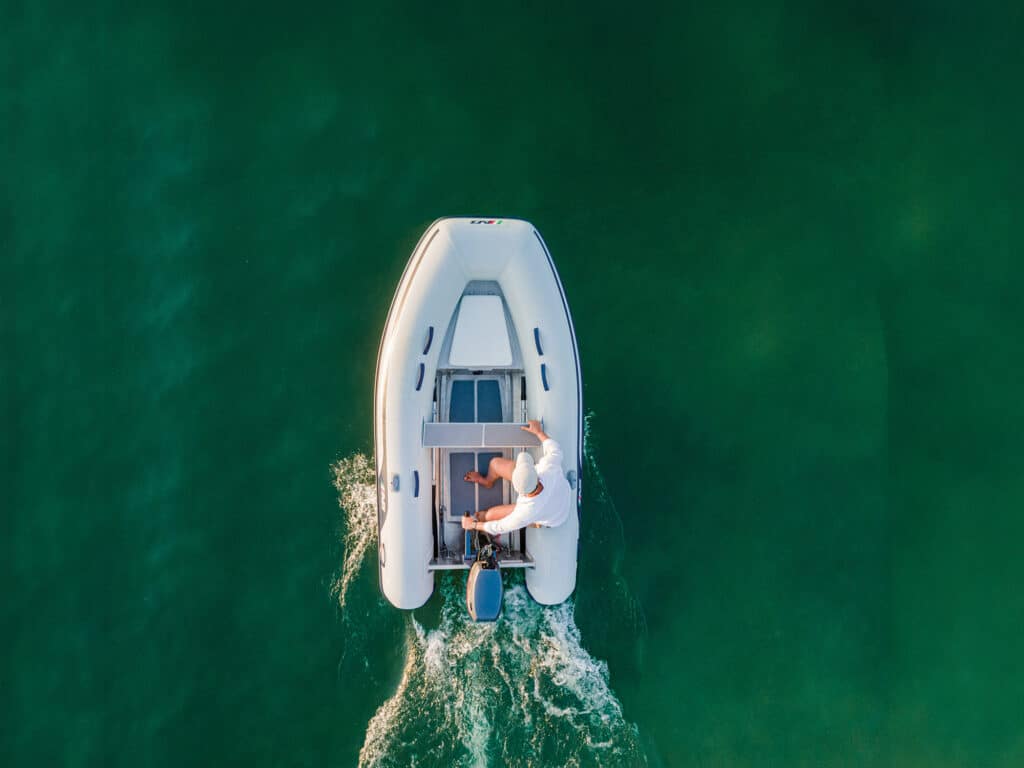
Aboard our 31-foot Hunter, Ragtime, our dinghy was the unsung hero of our cruising escapades. It was always the first thing we deployed upon arrival to a destination, and it was the last thing we packed away before we departed. It was our family Ford, our Honda for the harbor, our Miata of the marina (I’ll see myself out…).
To the untrained eye, a dinghy might appear to be no more than a floating dock cart to tote provisions, pets and people. But as cruisers well know, it’s so much more.
A dinghy is an all-access pass to exploring new coves and reaching short-water fishing spots. It’s a recon vessel for scouting surrounding depth, seafloor terrain and on-shore amenities. And, of course, it’s an escape pod should all hell break loose. A dinghy also provides endless amounts of fun, and even some boathandling education, for the kiddos.
Ragtime’s dinghy was a 9-foot-6-inch Achilles with a 4 hp Mercury outboard. For 13-year-old me, it allowed a real taste of freedom. We named it Cascade (after Scott Joplin’s jubilant rag “The Cascades”). I can still feel the elation of hopping in the dink after dropping the hook in a new port of call and then roaming around the harbor, checking out neighboring boats, scouring the shallows for marine life. When there were no other boats around and the no-wake zones approved of it, I’d tear off on plane in a puff of sea spray to an imagined finish line across the bay.
Our Cascade was state-of-the-art back in the ’90s, but it’s a dinosaur compared with offerings from the modern-day dinghy domain. Today, hybrid designs rule, combining the benefits of inflatable and rigid-hull boats. Lighter-weight materials have enhanced portability and improved fuel efficiency. Some manufacturers offer sail-conversion kits for multipurpose use. (Really, who doesn’t miss dinghy sailing?) Inflation systems have been enhanced; modular options for seating and stowage are often available; and electric propulsion has staked a serious claim in the power department.
When the time comes to replace your dinghy or buy your first one, these four standouts in the market are fit to serve any mothership between 25 and 45 feet.
Lammina AL 9.5
If strength and durability are atop your checklist, then the AB Lammina AL 9.5 is worth a look. AB’s line of marine-grade aluminum-hull inflatables comes with AWS certification, Orca 820 Hypalon fabric, and marine-grade aluminum and Axalta powder coating. The Superlight models, available at lengths of 9.5 feet and smaller, have a 0.09-inch-thick aluminum hull and are intended for boats with lighter-capacity davits. The hulls can resist abrasions from rocky shores, coral and sandy beaches, and the design cuts through wakes and chop with minimal pounding, resulting in a dry, stable ride. Check out the well-conceived bow locker and its capacity for a 6-gallon portable fuel tank.
Cadet Series
Compact and easy to stow in a cockpit locker, Zodiac’s Cadet series tenders hold their own against larger models. The progressive-diameter buoyancy tube design provides marked stability. Cadets have a longer life span and a high safety level because of a welded float closure and a glued overlap. Owners can choose among several versions. The Aero line, with an inflatable-air sole, is the lightest. The high-performance Aluminum line, with an aluminum sole, has an inflatable keel for quick planing and improved maneuverability. Fitting the slatted sole in the Roll Up line involves inflating buoyancy tubes. Stowage is a cinch; this tender folds up into a carrying bag, with no need to remove the slats.
Classic (CL) 310
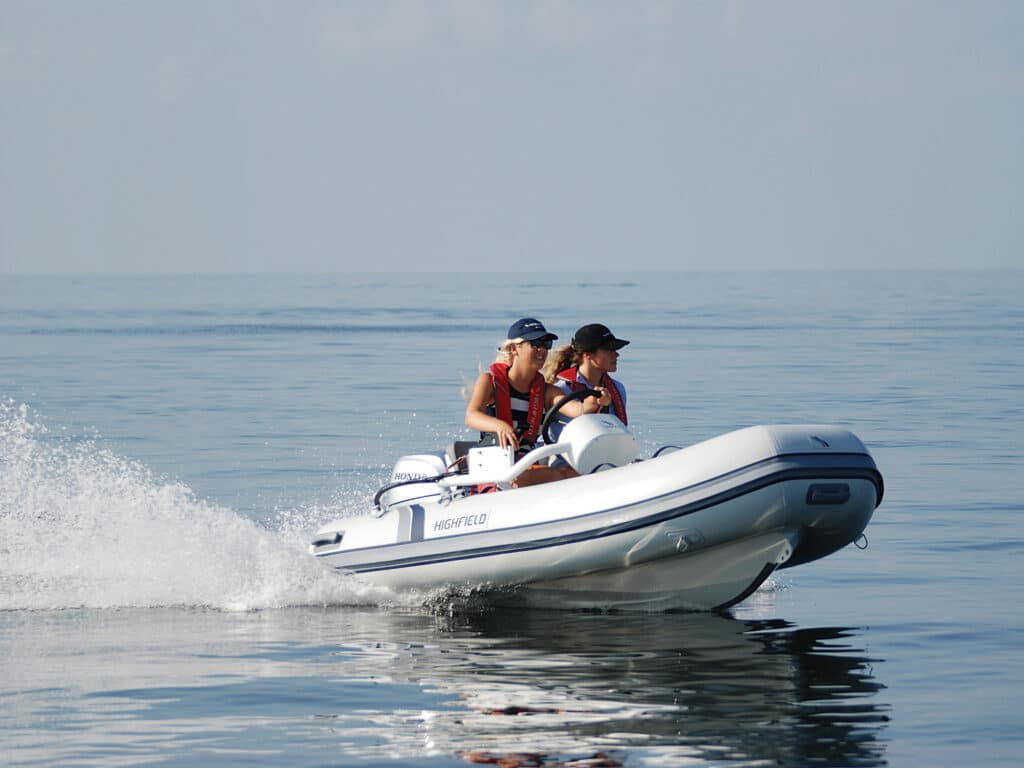
In 10 years of manufacturing tenders, the 310 has carved out its niche as Highfield’s bestselling tender size—ideal for as many as five people and up to a 20 hp engine. The standard bow on the CL 310 can stow a 6.5-gallon fuel tank or other equipment. Construction includes 2.5 mm thick, powder-coated marine-grade aluminum, coupled with tubes made of 1100-dtex coated fabric and a full-length keel guard. The optional FCT helm console forward gives the line a pickup-truck quality for long-range cruisers looking to haul gear and groceries. Total weight with the console and a 20 hp motor is about 400 pounds wet, which makes the 310 a solid, stable ride and puts it on a lot of davits. Highfield also makes an Ultralite line for cruisers who need a lighter platform that’s simpler to manage on deck.
Portland Pudgy
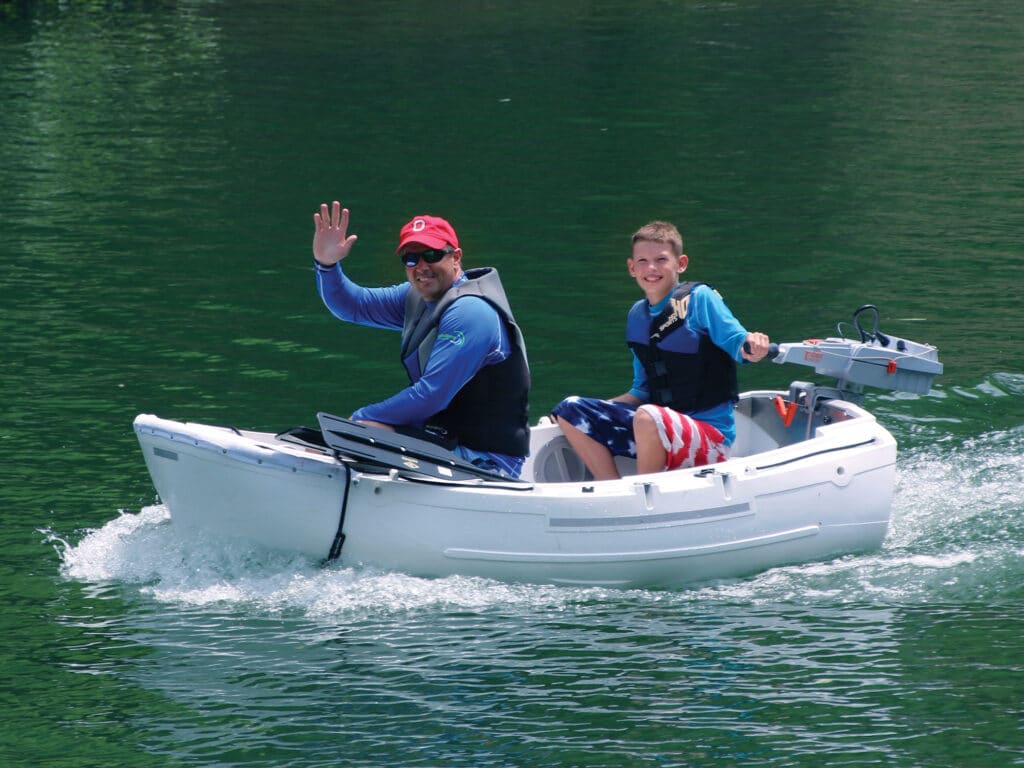
If lifesaving situations are high on your mind, then consider the Portland Pudgy. With or without the inflatable lifeboat canopy, the Pudgy is a dynamic lifeboat. It can’t deflate, and it can be sailed, rowed, or motored to safety. The Pudgy is constructed with rotation-molded, high-density compounded polyethylene (the same material used for top-quality whitewater kayaks). It’s stable, difficult to capsize, and easy to right. Closed-cell foam under the sole makes it “unsinkable,” according to the manufacturer. As for recreational use, the Pudgy is a fun family tender, a safe and sea-friendly sailing dinghy, and a great all-around rowboat/motorboat. Under sail, it can take surprisingly rough seas and heavy winds. Choose between a gaff or square-top Marconi sail. Every piece of equipment designed for the Pudgy can be stowed in the interior stowage chambers via five hatches. The Pudgy is US Coast Guard-approved as a dinghy for four people with a 2 hp or 3 hp motor.

